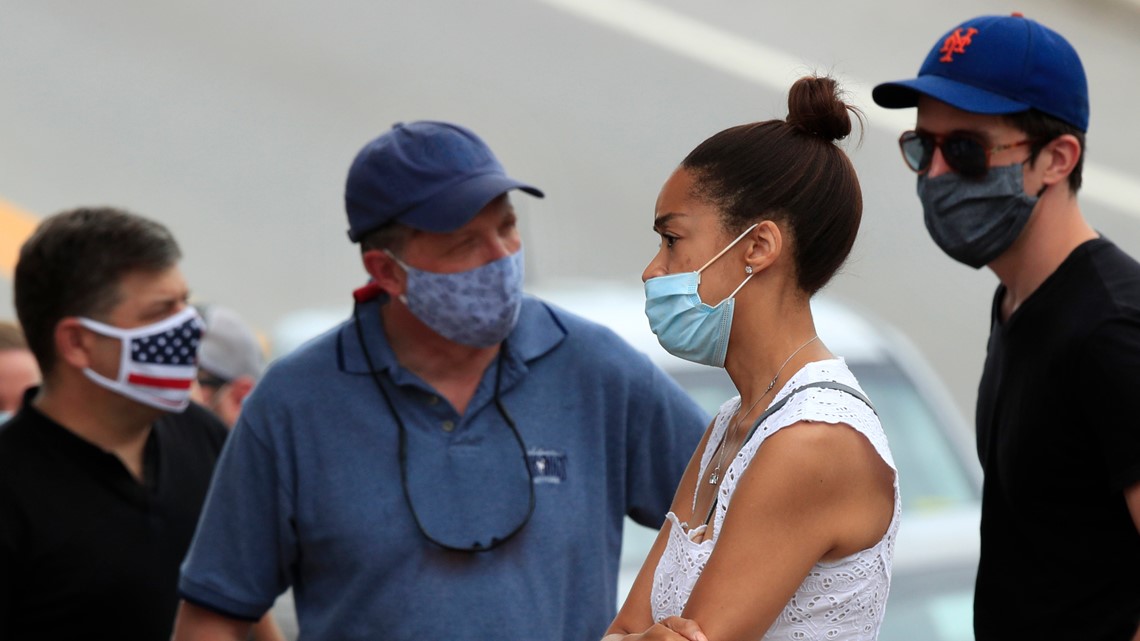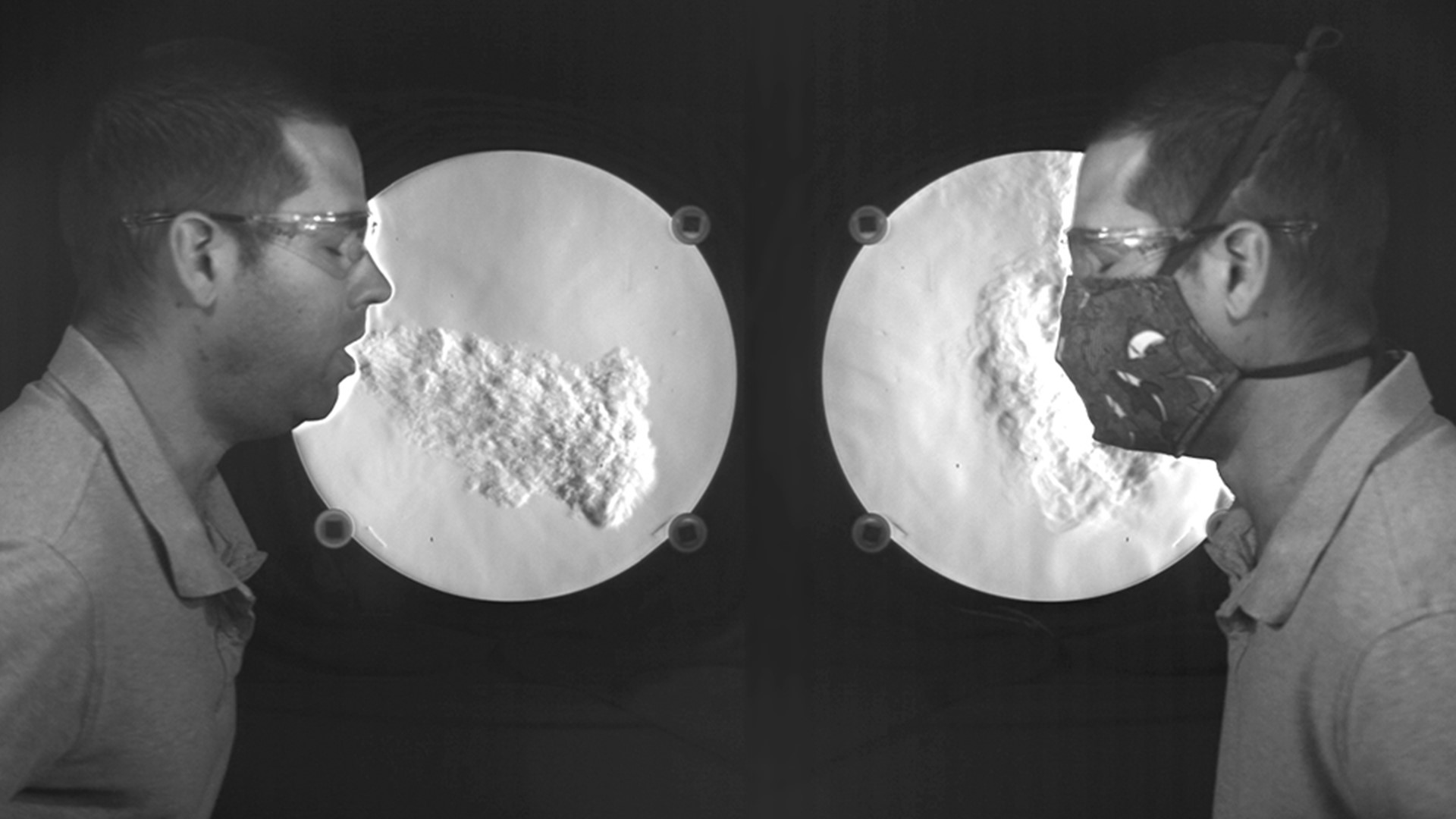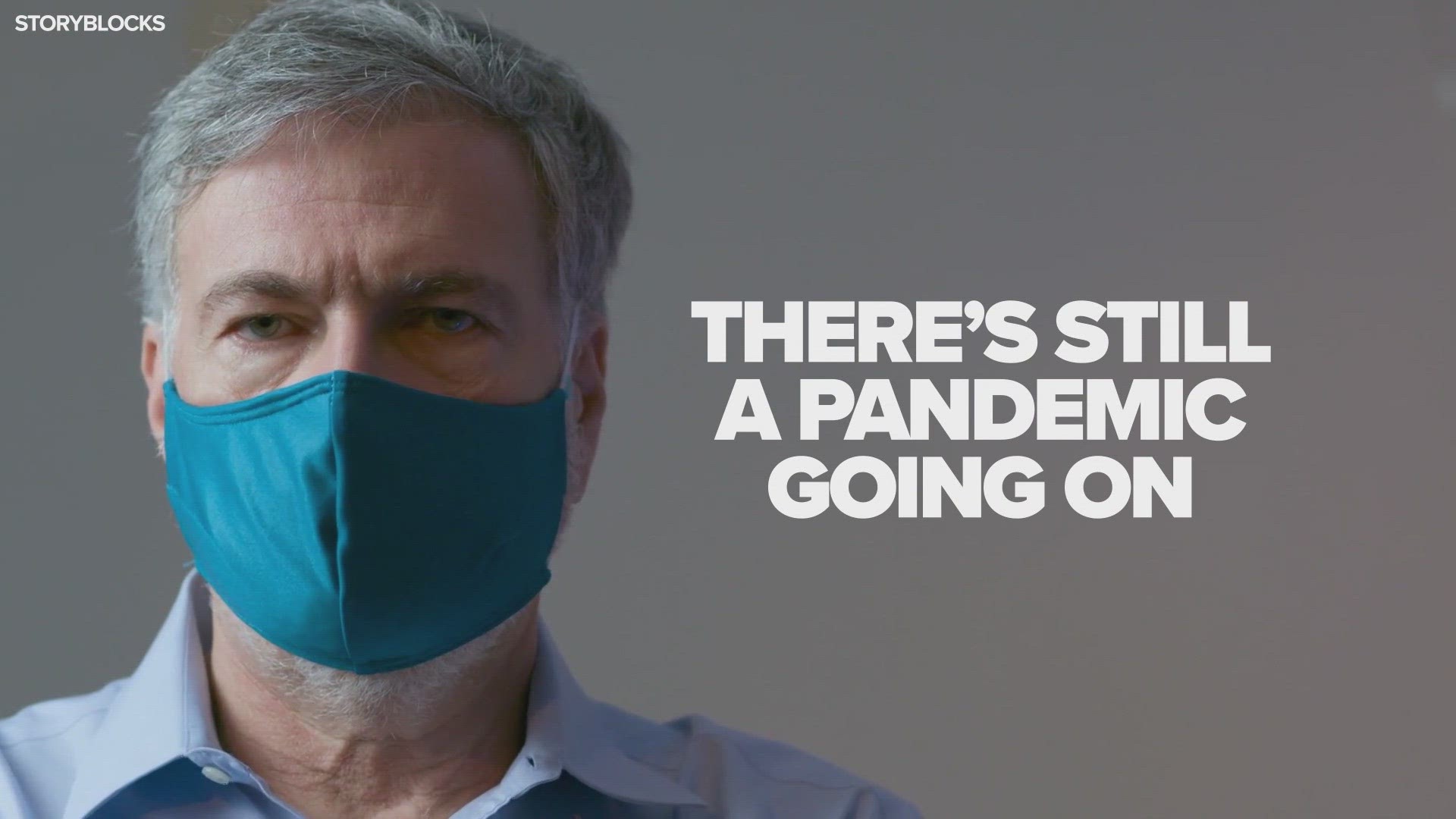WASHINGTON — As COVID-19 cases surge in the U.S., many states have moved forward with restrictions to mitigate the spread of the virus. Several states have issued new orders for masks to be worn in public. Health officials say face coverings help to prevent person-to-person spread of the coronavirus. Some states are requiring face coverings for everyone, while others are limiting the order to only workers or just in certain locales.
There is no federal mandate to wear a mask, and as of the end of July, there were still states that did not have mask orders. Nationwide retailers have had a tricky time navigating the issue along with enforcement in their stores, in various locales and states.
Melissa Murdock, spokesperson for the Retail Industry Leaders Association said that retailers "feel like they have to act since some governors haven't."
Recently Walmart, along with other retailers like CVS and Walgreens, who have stores across the U.S., said they would not prohibit entry to customers who refuse to wear a mask. Walmart is training employees to offer a complementary mask, but not to engage physically with customers or try and block their entry into stores.
Some states have only issued suggestions that people wear masks in public. Others have allowed local areas to decide, and have not made them mandatory.
More than half of U.S. states have implemented some kind of mask requirement. President Trump also offered his strongest endorsement yet of masks on Tuesday.
Here is a brief look at which states have issued statewide orders for masks. In general, mask requirements have made exceptions for people with medical conditions and children younger than 2 years old.
It's important to note that states and particular jurisdictions are updating their coronavirus rules often. Be sure to check with your local government to find out its current requirements.
Alabama
The rule requires a mask for anyone older than 6 who’s in public and within 6 feet of someone who’s not a relative. Businesses are not required to prohibit people from entering if they lack masks, but they are allowed to refuse admittance.
Gov. Kay Ivey announced the mask rule, which took effect July 16. She said violators could face fines of $500 and jail time, but added that enforcement would be difficult and penalties weren't the goal.
Arkansas
Face coverings were required statewide starting July 20, Gov. Asa Hutchinson announced. They'll be required in all indoor environments where exposed to non-household members and 6-foot distancing cannot be assured. They're needed outdoors too unless the distancing guidelines can be maintained or people live within the same household.
California
A statewide order requires people to wear masks when inside or in line for any indoor public spaces, in health care settings like hospitals and pharmacies, while waiting for or riding public transportation and in outdoor spaces where it's not possible to stay 6 feet apart from others.
Colorado
Gov. Jared Polis said he's issuing an executive order requiring face coverings in indoor public areas. Polis said his order overrides local decisions, applying to people older than 10 and allowing for several exemptions like eating at a restaurant and exercising alone. He said police officers, firefighters and EMTs also are exempt from the order because masks could hinder their ability to communicate.
Connecticut
Residents are required to wear cloth face coverings in public spaces if they can't maintain safe social distance. The mask must cover their nose and mouth. It must also be worn while in taxis, ride-sharing or similar services, or other public transportation.
Delaware
Those over the age of 12 are required to wear face coverings in public when social distancing cannot be maintained, such as grocery stores or public transportation. Coverings are recommended but not required for children ages 2-11. Businesses must require employees to wear face coverings while working in areas open to the public or if they are likely to come within 6 feet of other staff.
Georgia
Gov. Brian Kemp filed a lawsuit against the city of Atlanta to block it from enforcing its mandate to wear a mask in public and other rules related to the pandemic. Kemp and Georgia Attorney General Chris Carr argued that Atlanta Mayor Keisha Lance Bottoms overstepped her authority and must obey Kemp’s executive orders under state law.
The lawsuit came a day after Kemp clarified his executive orders to expressly block Atlanta and at least 14 other local governments from requiring people to wear face coverings.
Kemp says he strongly supports mask-wearing. He traveled the state this month to encourage face coverings. But he's maintained for weeks that cities and counties can't require them in public.
Hawaii
Cloth face coverings are required except for when doing permissible outdoor exercise activities and as long as social distancing requirements are maintained.
Gov. David Ige issued an order that customers of essential businesses and employees who have contact with customers or products must wear masks.
Indiana
Gov. Eric Holcomb said Wednesday that Indiana will have a statewide face mask mandate starting next week. The order will take effect Monday and apply to anyone ages 8 and older in any indoor public or business areas, and at outdoor public spaces when sufficient distancing can’t be maintained.
Kansas
Gov. Laura Kelly issued an executive order mandating the use of masks in public starting July 3. Kelly’s executive order requires every Kansan to wear a mask if they're around other people, where individuals aren't able to maintain 6 feet social distancing. Children under age 5 and people with medical conditions are exempt from the mask requirements.
Kentucky
Gov. Andy Beshear mandated wearing face coverings since July 10. They're required inside or waiting in line, and when difficult to maintain 6 feet of distancing from others who aren't members of the same household. People who are sick should wear a face covering while at home if they cannot keep distance from others, and at all times whenever they leave home.
Louisiana
Gov. John Bel Edwards announced a mandatory mask requirement for the state effective July 13. It allows for parishes without high COVID-19 incidence to opt out if they choose.
Michigan
People must wear, at minimum, homemade, non-medical grade face coverings when they enter enclosed public spaces. Employers must provide at least cloth face coverings to their employees.
Gov. Gretchen Whitmer strengthened her previous order requiring masks inside and among crowds. The new order clarifies that businesses may not assume an unmasked customer cannot medically tolerate a face covering, though they can accept a customer’s verbal representation to that effect.
Minnesota
A mask mandate is effective July 25 in public spaces across the state. Masks will be required in indoor settings like stores and restaurants, and violation could lead to a $100 fine for individuals, according to Gov. Tim Walz's executive order.
Maine
As part of Gov. Janet Mills' stay home order, the people of Maine are required to wear cloth face coverings when they're in public places and social distancing can't be maintained.


Maryland
People older than 9 have had to wear masks or cloth face coverings in retail spaces and on public transportation since mid-April.
Massachusetts
Gov. Charlie Baker has ordered the wearing of masks and advised visitors to Massachusetts to quarantine for two weeks — except for several states nearby.
Montana
Gov. Steve Bullock's statewide mask mandate applies in counties with four or more active cases of COVID-19 and requires masks indoors and outdoors when social distancing can't be observed.
Nevada
Gov. Steve Sisolak announced last month that Nevada will mandate the use of face coverings in public places in an effort to stem an increase of coronavirus cases that has hit the state as casinos, restaurants and other businesses began reopening. “No shirt, no shoes, no mask, no service,” Sisolak said, distilling the policy down to a tagline.
New Jersey
The state requires people to wear a mask over the nose and mouth in public spaces and anywhere unable keep 6 feet of distance from others. Face coverings are required in both indoor and outdoor public spaces and where social distancing is difficult to maintain.
New Mexico
In New Mexico, everyone is required to wear a mask in public except when drinking, eating, or under medical instruction. The state’s mandate has been in effect since May 16. It also requires people to wear face coverings while exercising, including at indoor gyms and fitness centers.
New York
People must wear face coverings in public situations where they're unable to maintain 6-foot distance or in a public or private transportation vehicle. Gov. Andrew Cuomo has issued executive orders that direct employers to provide essential workers with masks for free if they're in public and authorize businesses to deny entry to individuals not covering their faces.
North Carolina
As phase 2 continued on at the end of last month, the governor said the state would continue to require face masks while in public places. Gov. Roy Cooper announced on June 24 that masks were mandatory in public spaces and that North Carolina would remain in a safer-at-home order for several more weeks.
Ohio
Ohioans will be required to wear a mask in public or where they're unable to social distance. Gov. Mike DeWine announced that the mask mandate takes effect Thursday evening for everyone age 10 and older. It will also not include anyone who has a medical condition that keeps them from wearing a mask.
Oregon
Gov. Kate Brown announced people throughout Oregon will be required to wear face coverings in indoor public spaces starting July 1 to slow the spread of the coronavirus. The guidance applies to businesses and members of the public visiting indoor public spaces, she said in a news release.
Pennsylvania
Required when entering any business in all counties in the yellow and green phases of reopening. The yellow phase eases some restrictions on work and social interaction, but closures of schools, gyms, salons and limitations around large gatherings remain in place.
Rhode Island
An executive order is extended to August 3rd for face coverings to be worn in public, both indoors and outdoors, where 6 feet of social distance cannot be maintained. Exceptions are made for children under 2 and anyone whose health would be negatively impacted by covering their face.
Texas
People are required to wear a face covering over the nose and mouth inside a public space or outside when it is not possible to keep 6 feet of social distancing from another person not from the same household. Children younger than 10 and people with a medical condition that does not allow them wear a mask are exempt.
Virginia
With an executive order, Gov. Ralph Northam has made wearing masks mandatory inside public buildings throughout the Commonwealth. Under Virginia's mandate, people must wear masks inside stores, barbershops, restaurants, city buildings, on public transportation or anywhere where people can congregate.
People don't have to wear a mask while eating and drinking at a restaurant, while exercising, if they have trouble breathing or if health conditions prohibit wearing face coverings.
Washington, D.C.
The District requires face coverings be worn by everyone in essential businesses. Mayor Muriel Bowser has ordered that masks need to be worn when going out to grocery stores and public transit.
Washington State
Washington implemented a statewide requirement for people to wear facial coverings in public settings on June 26. The order requires face coverings when people are indoors in a public area, and outdoors in a public area when 6 feet of physical distancing can't be maintained.
West Virginia
Gov. Jim Justice issued an executive order last week mandating face coverings when people are inside buildings, though he has declined to impose a penalty for noncompliance.
The Associated Press and Masks 4 All contributed to this report.


